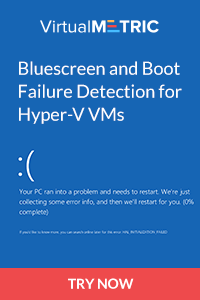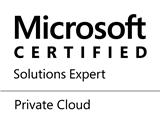Posted in
Virtual Machine Manager,
Windows Powershell,
Windows Server |
No Comment | 1,907 views | 06/06/2014 08:39
You can migrate selected Virtual Machines in a Hyper-V Cluster with following script.
That will migrate all virtual machines into target volume.
If target volume is not specified, it will look for best available CSV volume, and migrate virtual machine into that.
1
2
3
4
5
6
7
8
9
10
11
12
13
14
15
16
17
18
19
20
21
22
23
24
25
26
27
28
29
30
31
32
33
34
35
36
37
38
39
40
41
42
43
44
45
46
47
| # Target Volume
$TargetVolume = "Volume1"
# Create VM Array
$VMArray = New-Object System.Collections.ArrayList
$VMArray.Clear();
$AddArray = $VMArray.Add("VM01")
$AddArray = $VMArray.Add("VM02")
$AddArray = $VMArray.Add("VM03")
# Get Cluster Nodes
$ClusterNodes = Get-Cluster | Get-ClusterNode
foreach ($ClusterNode in $ClusterNodes)
{
# Get All Virtual Machines
$VMs = Get-VM -ComputerName "$ClusterNode"
foreach ($VM in $VMs)
{
# Get VM Information
$VMName = $VM.Name
if ($VMArray.Contains($VMName) -eq $True)
{
Write-Host " "
Write-Host "Working on $VMName .."
Write-Host "Hyper-V Host: $ClusterNode"
if (!$TargetVolume)
{
# Get Volume Information
$Volume = ((Get-ClusterSharedVolume | Select -ExpandProperty SharedVolumeInfo | Select @{label="Name";expression={(($_.FriendlyVolumeName).Split("\"))[-1]}},@{label="FreeSpace";expression={($_ | Select -Expand Partition).FreeSpace}} | Sort FreeSpace -Descending)[0]).Name
}
else
{
$Volume = $TargetVolume
}
# Move Virtual Machine
Move-VMStorage -ComputerName "$ClusterNode" -VMName "$VMName" -DestinationStoragePath "C:\ClusterStorage\$Volume\$VMName"
Write-Host "Done."
}
}
} |
# Target Volume
$TargetVolume = "Volume1"
# Create VM Array
$VMArray = New-Object System.Collections.ArrayList
$VMArray.Clear();
$AddArray = $VMArray.Add("VM01")
$AddArray = $VMArray.Add("VM02")
$AddArray = $VMArray.Add("VM03")
# Get Cluster Nodes
$ClusterNodes = Get-Cluster | Get-ClusterNode
foreach ($ClusterNode in $ClusterNodes)
{
# Get All Virtual Machines
$VMs = Get-VM -ComputerName "$ClusterNode"
foreach ($VM in $VMs)
{
# Get VM Information
$VMName = $VM.Name
if ($VMArray.Contains($VMName) -eq $True)
{
Write-Host " "
Write-Host "Working on $VMName .."
Write-Host "Hyper-V Host: $ClusterNode"
if (!$TargetVolume)
{
# Get Volume Information
$Volume = ((Get-ClusterSharedVolume | Select -ExpandProperty SharedVolumeInfo | Select @{label="Name";expression={(($_.FriendlyVolumeName).Split("\"))[-1]}},@{label="FreeSpace";expression={($_ | Select -Expand Partition).FreeSpace}} | Sort FreeSpace -Descending)[0]).Name
}
else
{
$Volume = $TargetVolume
}
# Move Virtual Machine
Move-VMStorage -ComputerName "$ClusterNode" -VMName "$VMName" -DestinationStoragePath "C:\ClusterStorage\$Volume\$VMName"
Write-Host "Done."
}
}
}
This script should work even if you have pass-through disks on virtual machine or virtual hba.
Posted in
Virtual Machine Manager,
Windows Powershell,
Windows Server |
No Comment | 897 views | 05/06/2014 07:30
You can migrate selected Virtual Machines in a Hyper-V server with following script.
That will migrate all virtual machines into target volume.
If target volume is not specified, it will look for best available CSV volume, and migrate virtual machine into that.
1
2
3
4
5
6
7
8
9
10
11
12
13
14
15
16
17
18
19
20
21
22
23
24
25
26
27
28
29
30
31
32
33
34
35
36
37
38
39
40
41
42
43
| # Target Volume
$TargetVolume = "Volume11"
# Create VM Array
$VMArray = New-Object System.Collections.ArrayList
$VMArray.Clear();
$AddArray = $VMArray.Add("VM01")
$AddArray = $VMArray.Add("VM02")
# Get All Virtual Machines
$AllVMs = Get-VM
foreach ($VM in $AllVMs)
{
# Get VM and Cluster Information
$VMName = $VM.Name
if ($VMArray.Contains($VMName) -eq $True)
{
Write-Host " "
Write-Host Working on $VMName ..
if (!$TargetVolume)
{
# Get Volume and Memory Information
$Volume = ((Get-ClusterSharedVolume | Select -ExpandProperty SharedVolumeInfo | Select @{label="Name";expression={(($_.FriendlyVolumeName).Split("\"))[-1]}},@{label="FreeSpace";expression={($_ | Select -Expand Partition).FreeSpace}} | Sort FreeSpace -Descending)[0]).Name
}
else
{
$Volume = $TargetVolume
}
# Move Virtual Machine
Move-VMStorage -VMName $VMName -DestinationStoragePath C:\ClusterStorage\$Volume\$VMName
Write-Host Done.
}
else
{
Write-Host " "
Write-Host Skipping $VMName ..
}
} |
# Target Volume
$TargetVolume = "Volume11"
# Create VM Array
$VMArray = New-Object System.Collections.ArrayList
$VMArray.Clear();
$AddArray = $VMArray.Add("VM01")
$AddArray = $VMArray.Add("VM02")
# Get All Virtual Machines
$AllVMs = Get-VM
foreach ($VM in $AllVMs)
{
# Get VM and Cluster Information
$VMName = $VM.Name
if ($VMArray.Contains($VMName) -eq $True)
{
Write-Host " "
Write-Host Working on $VMName ..
if (!$TargetVolume)
{
# Get Volume and Memory Information
$Volume = ((Get-ClusterSharedVolume | Select -ExpandProperty SharedVolumeInfo | Select @{label="Name";expression={(($_.FriendlyVolumeName).Split("\"))[-1]}},@{label="FreeSpace";expression={($_ | Select -Expand Partition).FreeSpace}} | Sort FreeSpace -Descending)[0]).Name
}
else
{
$Volume = $TargetVolume
}
# Move Virtual Machine
Move-VMStorage -VMName $VMName -DestinationStoragePath C:\ClusterStorage\$Volume\$VMName
Write-Host Done.
}
else
{
Write-Host " "
Write-Host Skipping $VMName ..
}
}
This script should work even if you have pass-through disks on virtual machine or virtual hba.


















